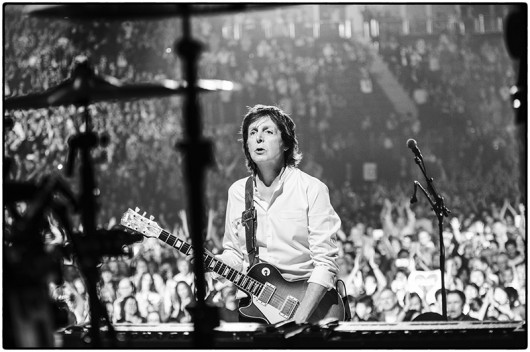While Ohio might seem like a less noteworthy tour stop for a rock star like Paul McCartney, the state’s prominent role in the history of rock ‘n’ roll contributes to its appeal.
On Aug. 24 University President Michael Drake announced at convocation that McCartney would be returning to Columbus for the first time in ten years.
The Oct. 13 concert at Nationwide Arena is one of just five upcoming dates on the former The Beatles member’s Out There tour.
When rock music first gained popularity, Ohio was at the forefront of that movement, said Todd Mesek, The Rock and Roll Hall of Fame’s vice president of marketing and communications. The term rock ‘n’ roll actually originated from Cleveland disc jockey Alan Freed, Mesek said.
“Ohio has always been a state where significant music history has been made — including the first rock concert, the Moondog Coronation Ball,” he said. “Even way beyond that, Columbus, Cleveland and Cincinnati have all been cities where the radio stations, the music clubs and the fans really broke some significant acts.”
Mesek said that Cleveland figures such as Freed and Leo Mintz, founder of the influential Record Rendezvous record store, helped to build a foundation for rock ‘n’ roll with the help of a fan base more excited than those in other regions.
“The freedom that especially the Cleveland DJs had to play new music and introduce new acts coupled with a rabid fan base in Cleveland and Ohio really helped acts go from popular to super stardom,” Mesek said.
Ohio became a central focus for rock music largely because of that supportive fan base, which Mesek said has stuck around today, citing acts from Led Zeppelin to The Black Keys that gained early support in the area.
“Part of it’s because there’s this Midwestern blue collar ethos where they just really wanted to come together,” he said. “It was hardworking people who wanted to let loose on the weekend.”
When booking a large act such as McCartney, demonstrating that fan support is vital, said Xen Riggs, associate vice president for the Office of Student Life at Ohio State.
“Columbus is certainly not a must-play market by any means, but it’s considered a very strong market,” he said. “We compete very well with nearby markets.”
Riggs said OSU established a relationship with Anschutz Entertainment Group, the company handling the Out There tour, on McCartney’s Columbus stops in 2003 and 2005. He said he spent the last few years asking about another performance before impressing AEG with the success of The Rolling Stones’ May 30 concert, the top-selling date on the tour as far as tickets.
The Rolling Stones and McCartney are part of a recent trend in which large acts, including others such as Rush and The Who, select Columbus over nearby cities such as Cleveland, the birthplace of rock ‘n’ roll.
Mesek added that the president of the university is also a factor when musicians select a venue.
While Drake, a guitar player and member of the Rock Hall of Fame’s Board of Trustees, may be a fan of McCartney, he’s certainly not the only one.
“I’ve been a Beatles fan and a Paul McCartney fan ever since I was young,” said Laurice Joseph, an associate professor in the College of Education and Human Ecology who will be attending the concert. “I’ve heard he puts on a really good show and he has a lot of energy — he’s just a good entertainer and performer.”
Mesek said a McCartney concert is more than just musical talent.
“It is no longer about seeing music, it is a cultural experience,” he said. “That’s beyond just a concert.”



